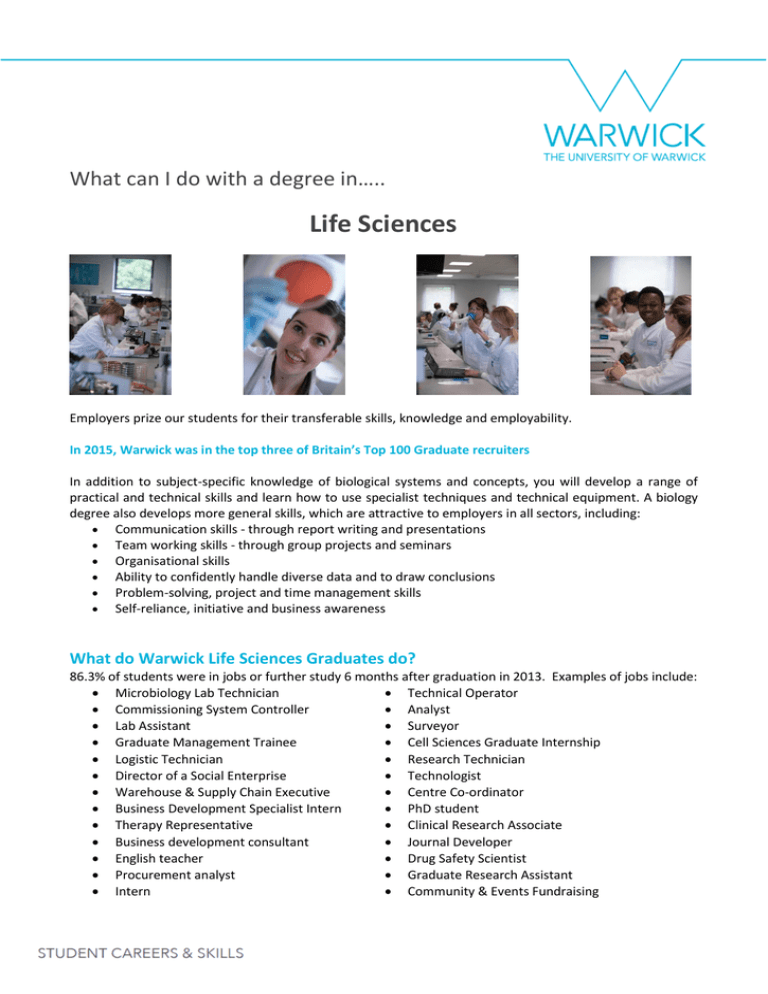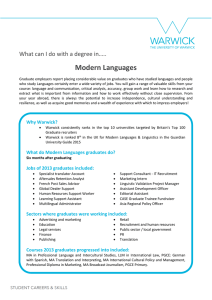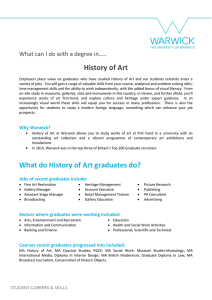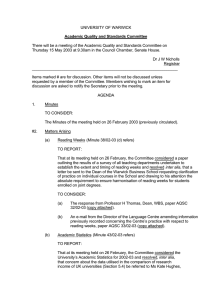Life Sciences What can I do with a degree in…..
advertisement

What can I do with a degree in….. Life Sciences Employers prize our students for their transferable skills, knowledge and employability. In 2015, Warwick was in the top three of Britain’s Top 100 Graduate recruiters In addition to subject-specific knowledge of biological systems and concepts, you will develop a range of practical and technical skills and learn how to use specialist techniques and technical equipment. A biology degree also develops more general skills, which are attractive to employers in all sectors, including: Communication skills - through report writing and presentations Team working skills - through group projects and seminars Organisational skills Ability to confidently handle diverse data and to draw conclusions Problem-solving, project and time management skills Self-reliance, initiative and business awareness What do Warwick Life Sciences Graduates do? 86.3% of students were in jobs or further study 6 months after graduation in 2013. Examples of jobs include: Microbiology Lab Technician Technical Operator Commissioning System Controller Analyst Lab Assistant Surveyor Graduate Management Trainee Cell Sciences Graduate Internship Logistic Technician Research Technician Director of a Social Enterprise Technologist Warehouse & Supply Chain Executive Centre Co-ordinator Business Development Specialist Intern PhD student Therapy Representative Clinical Research Associate Business development consultant Journal Developer English teacher Drug Safety Scientist Procurement analyst Graduate Research Assistant Intern Community & Events Fundraising Graduate Recruiters tell us that what they want from applicants is: A good degree from a good university Work Experience Involvement in extra-curricular activities The ability to describe and articulate their unique achievements and skills What do our Life Science students say? “When I first started university I was not quite sure what I wanted to do for a career so the broadness of the Biological Sciences course was ideal. I am currently enjoying an intercalated year at a major pharmaceutical company with my work based around clinical trials. With this experience and the course being so flexible I am now able to return to university with tailored final year modules to suit a career in the pharmaceutical industry.” Andrew Armstrong, BSc Biological Sciences with Intercalated Year “My Microbiology and Virology degree has been the best experience of my life and Warwick University has enabled me to reach my full potential. Jenni Shepherd , BSc Microbiology and Virology “The Undergraduate Research Scholarship Scheme was a fantastic opportunity to utilise the skills developed during my degree and the advanced facilities have allowed me to contribute towards the cutting edge research performed here. I feel this learning experience has benefited me greatly for future prospects including studying for a PhD.” Michael Chow, BSc Biochemistry What do our Life Science graduates say? “The BSc in Biochemistry gave me a strong technical background in research methods and practice, and a good understanding of the statistics and epidemiology that underpin much of the work that I now do. The degree also enabled me to reason scientifically which has been particularly helpful when reviewing evidence which is a key part of my role in being able to provide technical support. The lectures I attended at Warwick covered a wide range of topics and were often given by leaders in their field- this gave me a wider insight into the potential career paths that use Biochemistry and initiated my interest in Public health.” Rachel Evans, Nutrition Officer with Save the Children, BSc Biochemistry (2009) Student Careers & Skills http://www2.warwick.ac.uk/services/scs Life Science Career Profiles http://www.prospects.ac.uk/options_biology.htm http://www.sgm.ac.uk/en/education/careers.cfm Find out about career paths and employment destinations of recent graduates from the University of Warwick: go.warwick.ac.uk/whatdowarwickgradsdo




